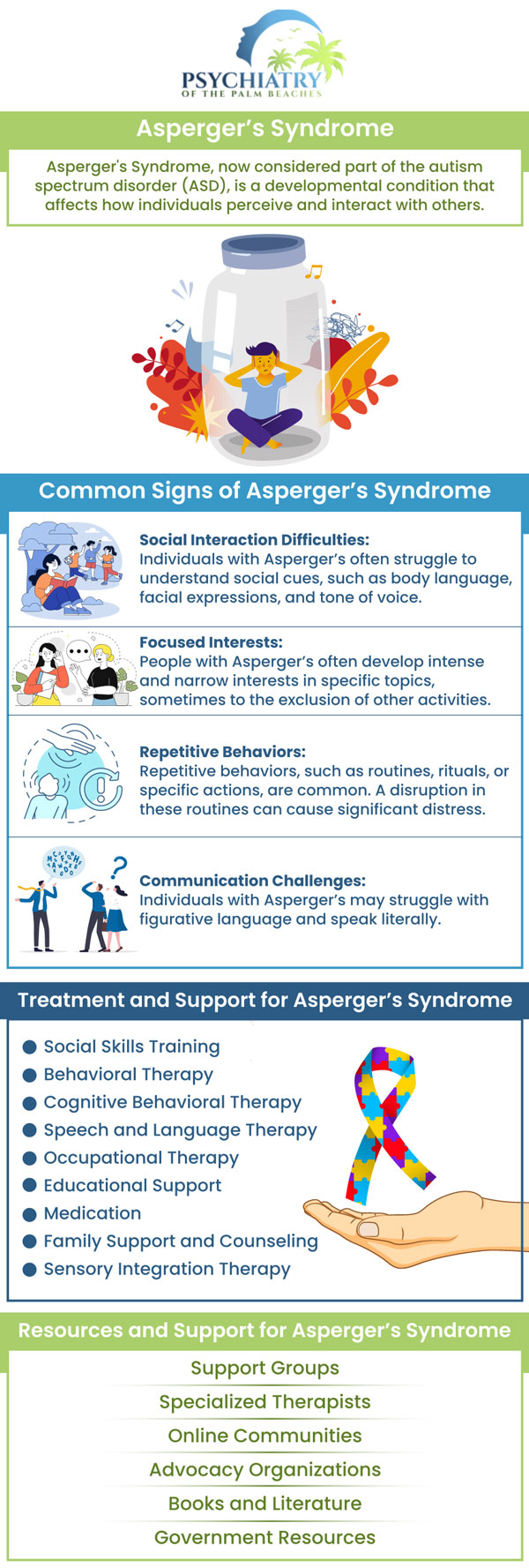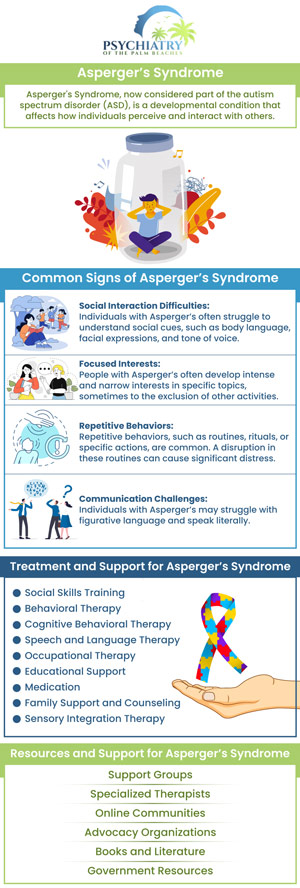Asperger’s Syndrome Treatment Clinic in Jupiter, FL
At Psychiatry of the Palm Beaches, we provide specialized Asperger’s Syndrome treatment in Jupiter, FL. Our expert team focuses on creating personalized care plans that address social challenges, communication, and behavioral management. We work closely with individuals and their families to help them navigate daily life with confidence and support. For more information, contact us today or book an appointment online. We are conveniently located at 3893 Military Trail, Suite 3, Jupiter, FL 33458.


Table of Contents:
Can individuals with Asperger’s live independently?
Are there specific therapies for improving emotional regulation in Asperger’s syndrome?
What is the role of autism spectrum disorder (ASD) in Asperger’s syndrome?
What role does medication play in managing aggression in Asperger’s syndrome?
Many individuals with Asperger’s are capable of living independently, though the level of support required can vary from person to person. Daily functioning skills, such as managing finances, maintaining a household, and navigating community settings, can be learned and strengthened over time. Some may need targeted life skills training or structured guidance in certain areas, while others develop these abilities naturally. The degree of independence often depends on the individual’s strengths, challenges, and access to resources that help build self-sufficiency.
Social and communication differences, which are common in Asperger’s, can sometimes influence the ability to live entirely without assistance. Learning how to manage interpersonal relationships with neighbors, landlords, or employers can be a key factor in sustaining independent living. Skills such as self-advocacy and problem-solving are often prioritized during intervention in order to help ensure the individual can navigate situations that arise in daily life.
Ongoing support from therapists, family, or community programs can be valuable even for those living on their own. These supports may be periodic check-ins rather than constant oversight, giving the person autonomy while still providing a safety net when needed. By tailoring this assistance to the individual’s needs, independence can be maintained without undermining self-confidence. Specialists at Psychiatry of the Palm Beaches can work with patients to ensure they have the right structure and support systems in place to allow the individual to make decisions, manage responsibilities, and engage with the world in a way that suits their abilities and goals.
Therapies designed to improve emotional regulation in individuals with Asperger’s often focus on helping the person recognize and understand their emotional states. Cognitive Behavioral Therapy is commonly used to provide tools for identifying triggers and practicing more adaptive responses to stress or frustration. This type of approach may also address the thought patterns that can intensify emotional reactions. Mindfulness-based strategies can also be effective, as they encourage the individual to observe their emotions without immediate reaction. These practices help create a pause between the feeling and the response, giving space for more measured decision-making. Over time, this can lessen the intensity of emotional surges and make it easier to cope in challenging situations.
Some benefit from structured social skills groups, where emotional regulation is taught alongside communication techniques. These settings allow individuals to practice interpreting social cues and responding in ways that promote smoother interactions. Role-playing and guided feedback within these programs can build confidence in handling real-life scenarios.
At Psychiatry of the Palm Beaches, treatment plans for emotional regulation are developed with the understanding that each person’s needs and learning style are unique. The combination of therapeutic methods is chosen to match the individual’s goals, preferences, and current skill set, leading to a more personalized path toward managing emotions effectively.
Asperger’s syndrome is considered part of the autism spectrum, and this broader classification influences how treatment is approached. By understanding Asperger’s within the context of ASD, clinicians can draw from a range of strategies proven effective for the spectrum as a whole, while still tailoring interventions to the unique traits of the individual. This allows for a more complete picture of strengths, needs, and potential areas for growth.
The available context of viewing conditions through the ASD framework also helps assess the variability in abilities and challenges that may appear, even among those with the same diagnosis. This perspective encourages flexibility in treatment planning, as no single approach works for everyone. It also emphasizes that progress is not measured solely by reducing challenges, but by fostering greater independence, self-understanding, and quality of life. Research and clinical practice within the ASD field have produced numerous evidence-based therapies that can be adapted for someone with Asperger’s. These may include social communication training, behavioral interventions, and sensory integration techniques. Access to this broader pool of strategies can enhance the chances of finding methods that resonate with the individual.
Specialists at Psychiatry of the Palm Beaches integrate ASD-informed approaches into their work with individuals diagnosed with Asperger’s, ensuring that the treatment plan reflects both the shared characteristics of the spectrum and the person’s unique profile. This approach maximizes the potential for meaningful and lasting improvements.
Medication is sometimes used as part of a comprehensive plan to address aggression in individuals with Asperger’s. While it does not change the underlying condition, it can help reduce the intensity or frequency of aggressive outbursts when these are linked to anxiety, mood dysregulation, or other co-occurring issues. This can make it easier for the individual to participate in therapy and daily activities without the same level of disruption. The choice to use medication depends on several factors, including the severity of symptoms, the individual’s overall health, and their response to non-medication interventions. Often, medication is combined with behavioral therapies that teach alternative coping mechanisms. This combination can address both the immediate symptoms and the underlying triggers.
Different classes of medication may be considered, such as mood stabilizers, selective serotonin reuptake inhibitors, among others, all depending on the specific nature and the of the patient’s symptoms. Regular monitoring is essential to ensure effectiveness and minimize side effects.
Providers at Psychiatry of the Palm Beaches will incorporate medication as one tool among many. By integrating it with therapeutic supports and individualized coping strategies, the goal is to create a balanced treatment plan that improves the individual’s stability, safety, and ability to engage positively with others.
Specialized Asperger’s Syndrome Care with Our Team
Our team offers specialized care for Asperger’s Syndrome at Psychiatry of the Palm Beaches. Our tailored treatment programs focus on enhancing communication skills, managing sensory sensitivities, and improving social relationships, with a goal of increasing independence and improving overall well-being. For more information, contact us today or book an appointment online. We are conveniently located at 3893 Military Trail Suite 3 Jupiter FL 33458. We serve patients from Jupiter FL, North Palm Beach FL, Riviera Beach FL, West Palm Beach FL and surrounding areas.
Check Out Our 5 Star Reviews



Additional Services You May Need
▸ Mental Wellness
▸ Relationship Coaching
▸ Depression and Mood Disorders
▸ Women’s Health
▸ Panic Disorder
▸ Medications Management
▸ Men’s Health
▸ Individual Psychotherapy
▸ Bipolar
▸ ADHD
▸ Geriatric Mental Health
▸ Couple’s Counseling
▸ Obsessive Compulsive Disorder
▸ Social Phobia Treatment
▸ Eating Disorders
▸ Post Traumatic Stress Disorder
▸ Psychotic Disorders


